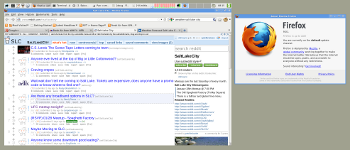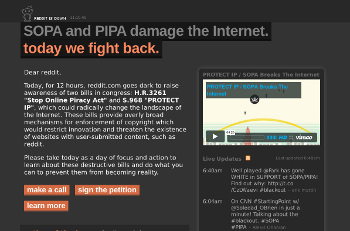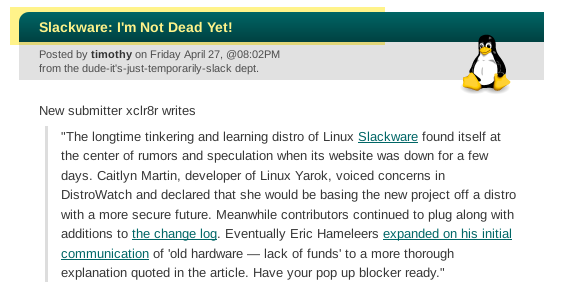Reddit is down to protest SOPA/PIPA. Wikipedia is also down. As an experiment, let's see if I can still write something from memory and without fact checking. ;)
Of course, if wikipedia were up and running, I could have simply linked to
their article on the subject. I am sure that their crowd-sourced article is infinitely better than what I've pieced together here. Write your congressman to stop introducing breakage into the internet.
- Tit: The internet perceives censorship as damage and routes around it.
- Tat: SOPA would break DNS at the TLD level
In case, you haven't heard about reddit, here is my summary of what it is. Reddit is one of the most popular and innovative sites on the internet. It is ranked within the top 75 websites in the world, as estimated by total traffic; it is ranked within the Alexa top 125. Recently, Reddit released some of their traffic statistics that showed 2 billion page views in one month. That's fine and good, but what is it? It is a website that is designed to provide news aggregation to appropriate sub-communities within their total audience. They have the seemingly simple goal of matching the topic being discussed with an appropriate news consumer. This isn't a new idea- not by any measure. TV news (remember TV news?) was originally categorized into segments for basic news, weather, and sports. Newspapers (remember newsprint?) have always had a lot of sections: local, national, editorial, comics, classifieds, etc. The concept is the same, only Reddit takes this concept to its ultimate limit. There are literally tens of thousands of categories with content provided and driven by a matching community. Most reddit communities, or subreddits, are small. However, the most popular have over 1 million subscribers! Popular subreddits are r/pics, r/funny, r/todayilearned, r/askreddit, r/iama, r/explainitlikeimfive. There are a lot of technical subreddits, too: r/linux, r/buildapc, r/opensource, etc. The content on most of these subreddits is lightly moderated. That means users will mostly decide what will be popular and what is relevant. A story rises and falls based on popularity. Users really vote for good stories, moving them up in the massive stack of past stories. Also, bad stories get voted down, and they sink deeper into the accumulated pile. If a story becomes popular at the subreddit level it can be promoted to the main page and receive wide coverage from the vast overall audience. The method seems to work. Even stories with very obscure content can receive coverage, simply by catching the interest of a critical mass of the community. That is my view from 10,000 feet. I really could've used wikipedia to check my facts!
Here is a recent screenshot showing the SaltLakeCity subreddit:
 .
.Because Reddit is doing a lot of things right, and providing a lot of innovation it is the heir-apparent to earlier web pioneers that showed the potential and versatility of on demand news sites. Slashdot is the grandfather of all of these sites. Reddit added features and flexibility and it's hard to see it losing out to anyone else. The government is trying to interject itself into this space. Reddit would be affected to the point that they've said they'd close their doors. Amazingly, reddit keeps their website running with only ten or eleven employees. If SOPA/PIPA pass, then bye-bye reddit!
Here is a taste of what the law could lead to, no more reddit:
 .
.What about reddit has made it popular?
- Empowers users to build and manage their own content
- Easy and powerful user interface to format text, embed graphics, and link to other sites in a totally immersed web environment
- heir-apparent to earlier news aggregation sites (slashdot, digg)
- heir-apparent to usenet classification-type system. subreddits match closely with newsgroups in usenet. For example, comp.os.linux.misc matches up with discussions at r/linux and r/opensource.
- Dynamic rendering of the site on a per user basis. Rendering is determined based on several factors including user subscription and group access control lists. I am guessing that these requirements must place significant demand on their Amazon based servers that are used to provide the site to its 1 million plus simultaneous users. As users know, the site sometimes struggles with delivering content 100% of the time.
Sites like reddit are at the forefront of innovation. Empowering users means giving people what they want. That can be as simple as providing the news they want. It also can be used in creative ways, ways never imagined by their creators. Social media and technology were at the heart of the Arab Spring uprisings. The people demanded their governments give them what they want, or get out of the way.
 ..
Slackware, like a lot of free software / open source coding projects, relies a lot on unpaid volunteers. What is unique about Slackware is that it is very much the vision of one man, Patrick Volkerding. He coordinates every new release with a small team of developers worldwide, including Robby Workman and Eric Hamleers. Workman, I believe, does a lot of work on the website, Slackbuilds.org, while Hamleers is a long time developer who is the person most responsible for porting the Slackware to 64-bit Intel processors, and now is working on an important port to the ARM architecture. That will be very important going forward as cellular sized devices continue to displace the personal PC as the platform of choice. The Raspberry Pi devices could change the world! Slackware, as the oldest Linux distribution still being actively maintained and used, is going to be a part of that. As far as lags in development, from my own experience, most of the recent snags have been due to component pieces of the gnu/linux platform being deficient, notably pieces of X and the kernel itself. The shift towards different graphical paradigms caused some disruption, too. Look to those issues before blaming Patrick Volkerding.
..
Slackware, like a lot of free software / open source coding projects, relies a lot on unpaid volunteers. What is unique about Slackware is that it is very much the vision of one man, Patrick Volkerding. He coordinates every new release with a small team of developers worldwide, including Robby Workman and Eric Hamleers. Workman, I believe, does a lot of work on the website, Slackbuilds.org, while Hamleers is a long time developer who is the person most responsible for porting the Slackware to 64-bit Intel processors, and now is working on an important port to the ARM architecture. That will be very important going forward as cellular sized devices continue to displace the personal PC as the platform of choice. The Raspberry Pi devices could change the world! Slackware, as the oldest Linux distribution still being actively maintained and used, is going to be a part of that. As far as lags in development, from my own experience, most of the recent snags have been due to component pieces of the gnu/linux platform being deficient, notably pieces of X and the kernel itself. The shift towards different graphical paradigms caused some disruption, too. Look to those issues before blaming Patrick Volkerding. .
. .
.